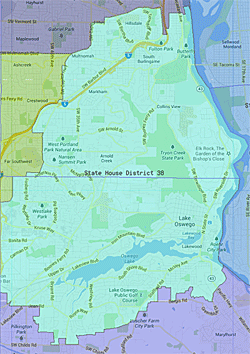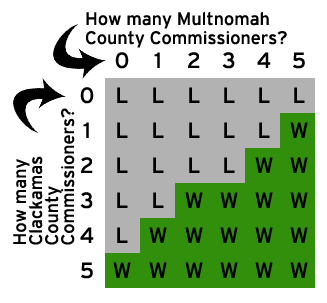OR-HD-38: Garrett wins judicial appointment, creating another vacancy in the House - but this time, it's a little complicated.
Kari Chisholm
In a bit of news that broke on Christmas Eve, Rep. Chris Garrett (D-Lake Oswego) has been appointed to the Oregon Court of Appeals by Gov. John Kitzhaber. He'll replace Judge David Schuman, who is retiring effective February 1.
His departure from the Oregon House creates a vacancy just before the upcoming February session.

Click to zoom. Explore map at Moonshadow Mobile.
And compared to the two recent vacancies in Multnomah County, this one is quite a bit more complex. You see, HD 38 is split between Clackamas and Multnomah counties - it's essentially Lake Oswego and Southwest Portland.
The first step is the same as always: Democratic Party precinct committee people from the district, from two counties in this case, will meet to select 3-5 nominees.
But here's where it gets interesting: The county commissions from both counties will gather in joint session to select the appointee. But the ten members won't have equal votes. Each one will have 20% of the vote assigned to their county, based on the number of voters (not citizens or residents) in the district from that county.
I'm working on tracking down the number of voters on each side of the county line for you, but assuming voter registration tracks population (and it might not), then the split will be 55% for Clackamas County and 45% for Multnomah County. (Also, the split in the 2012 voter turnout was 55.2% to 44.8%, so we're likely on track here.)
Update: Yup, it's 55/45. (Or to be precise, 54.797% to 45.203%. Which doesn't change the numbers below at all.)
Now, it's really important to note that the county commissions meet in joint session and each commissioner makes his or her own pick. Contrary to some chatter I've heard, the two counties don't meet separately and then the bigger county's pick beats out the smaller county's pick. (If that were the case, there would be no point in even including the smaller county in the process.)
So, each Clackamas commissioner will get 11% of the vote, while each Multnomah commissioner will get 9% of the vote. That means that the successful nominee will need at least one Clackamas County vote.
I produced a little chart that identifies the various possible combinations of votes required in order to get a majority in the HD-38 joint session vote. (I'll revise when I get the exact numbers from the county clerks.)

In other words, a unanimous Multnomah vote paired with a single Clackamas vote can carry the day. But if you've got just four Multnomah votes, you'll need two Clackamas votes to win. On the flip side, while a unanimous Clackamas vote wins, if you've got just four Clackamas votes, you'll need one Multnomah vote to win. In a truly split-vote scenario, you could also win with three Clackamas votes and two Multnomah votes (while the reverse is not a winner.)
Given all this, as well as the complex partisan dynamics on the Clackamas County commission, the precinct committee people ought to ensure at least three rock solid candidates that they can live with. None of that silly "here's one good candidate, and two losers" stuff we've seen in years past that tries to force the county commissioners' hands.
Oh, and in the event that the County Commissioners can't agree? It goes to Governor Kitzhaber, and he can pick anyone he wants.
 |
More Recent Posts | |
Albert Kaufman |
|
Guest Column |
|
Kari Chisholm |
|
Kari Chisholm |
Final pre-census estimate: Oregon's getting a sixth congressional seat |
Albert Kaufman |
Polluted by Money - How corporate cash corrupted one of the greenest states in America |
Guest Column |
|
Albert Kaufman |
Our Democrat Representatives in Action - What's on your wish list? |
Kari Chisholm |
|
Guest Column |
|
Kari Chisholm |
|
connect with blueoregon



